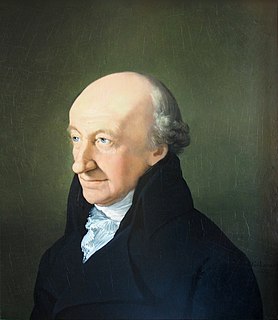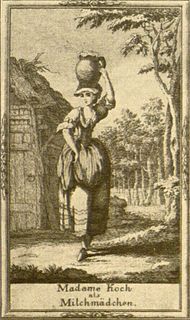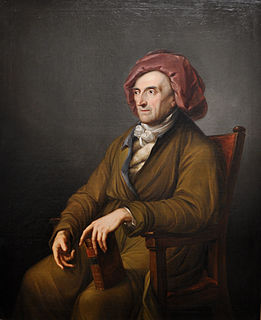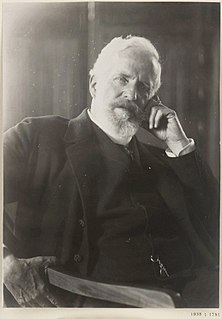
Weidmannsche Buchhandlung is a German book publisher established in 1680 that remained independent until it was acquired by Verlag Georg Olms in 1983.

Weidmannsche Buchhandlung is a German book publisher established in 1680 that remained independent until it was acquired by Verlag Georg Olms in 1983.
Weidmannsche Buchhandlung was established in 1680 in Frankfurt by Moritz Georg Weidmann (1658-1693), who moved to Leipzig in 1681. [1] Johann Ludwig Gleditsch, brother of Johann Friedrich Gleditsch, married Weidmann's widow in 1694 and built up the business of the house, while training the younger Moritz Georg Weidmann (1686 - 1743) to take over the business. [2] Gleditsch published authors such as Wieland, Gellert, Lessing, Lavater and Heyne. The most significant achievement of the Gleditsch brothers was to persuade the leading Dutch booksellers to send their works to the Leipzig fair instead of to Frankfurt. [3]
Weidmannsche Buchhandlung continued to publish in Leipzig until 1854, reaching its height under Philipp Erasmus Reich, called the "nation's bookseller". The firm moved to Berlin in 1854, and continued publishing in Berlin, Dublin and Zurich under the Reimer publishing family. In 1983 the firm was taken over by Verlag Georg Olms. [1] Books printed in Berlin bore the Latin imprimatur "apud Weidmannos, Berolini".
The publishing house was led by:
The publisher has published writings of:

Christoph Martin Wieland was a German poet and writer. He is best-remembered for having written the first Bildungsroman, as well as the epic Oberon, which formed the basis for Carl Maria von Weber's opera of the same name. His thought was representative of the cosmopolitanism of the German Enlightenment, exemplified in his remark: "Only a true cosmopolitan can be a good citizen."

Christian Fürchtegott Gellert was a German poet, one of the forerunners of the golden age of German literature that was ushered in by Lessing.

Christian Karl Friedrich Hülsen was a German architectural historian of the classical era who later changed to studying the Middle Ages and the Renaissance.

Marie Sophie von La Roche was a German novelist. She is considered the first financially independent female professional writer in Germany.
Johann Jakob Bethmann was a German merchant and shipowner.

Johann Friedrich Gleditsch was a major book publisher in the late 17th and early 18th centuries.

Moritz Georg Weidmann was a German bookseller and publisher based in Leipzig, accredited to the courts of Poland and the Electorate of Saxony. He was the son of the Moritz Georg Weidmann Senior. He entered the business in 1713 as a partner, and in 1717 took complete control of his father's bookstore, which his stepfather, Johann Ludwig Gleditsch, had managed for him since 1694.

Moritz, Prince of Dietrichstein, was a German prince member of the House of Dietrichstein, 10th and last Prince (Fürst) of Dietrichstein zu Nikolsburg, Count of Proskau-Leslie, Baron (Freiherr) of Hollenburg, Finkenstein and Thalberg.

Franziska Romana Koch, née Gieraneck, Giwraneck, Giraneck, Jiránek (1748–1796) was a German ballet dancer, soprano, and actress. First a dancer as the member of the theatre company Kochische Gesellschaft, she also trained her voice and worked at the court theatre of Weimar. Anton Schweitzer composed the opera Alceste for her, and its librettist Christoph Martin Wieland celebrated her performance in the title role in a poem. She later worked in Gotha, and finally in Leipzig as a member of Bondini's company, where she retired in 1787.
The 13 Cuirassier regiments of Old Prussia were formed in the mid-17th to mid-18th centuries, and formed the basis of Frederick the Great's vaunted cavalry.

Johann Friedrich Wilhelm Jerusalem was a German Lutheran theologian during the Age of Enlightenment. He was also known as "Abt Jerusalem".

Evening is an 1821 oil on canvas painting by Caspar David Friedrich, now in the Niedersächsischen Landesmuseum Hannover. With Morning, Midday and Afternoon, it forms a series on different times of day.
Santa Stella was an Italian soprano. She was also known as Santa Stella Scarabelli and after her marriage to Antonio Lotti on 12 February 1714 as Santa Lotti or La Santini.

The Opernhaus vorm Salztor was an opera house in Naumburg, then Saxe-Zeitz, that opened in 1701. The house was built during the regency of Moritz Wilhelm, Duke of Saxe-Zeitz, on his behalf. In 1716, it burned down and was not rebuilt. In the 15 years of its existence, at least 14 different operas and one play were performed there. One of them survived, Johann David Heinichen's Der glückliche Liebeswechsel oder Paris und Helena, and was revived in 2012 in a concert performance.

Friedrich Maximilian Thiersch, after 1897 Ritter von Thiersch, was a German architect and painter in the late Historicist style.

Georg Olms Verlag is a Hildesheim-based book publisher with publications in the field of Geisteswissenschaft : first publications, ebooks, reprints and microfiche in the fields of archaeology, Arab studies, history, history of medicine and natural sciences, hippology, Jewish studies, cultural studies, literary criticism, art history, musicology, modern philology, Oriental studies, philosophy, theology and religious studies.
{{cite book}}: CS1 maint: multiple names: authors list (link)